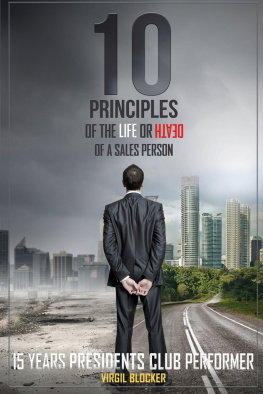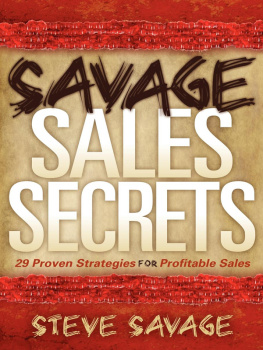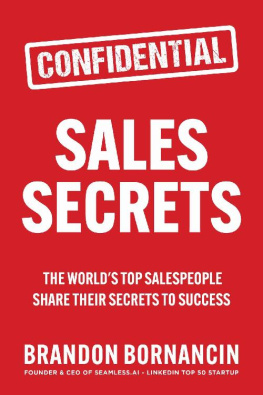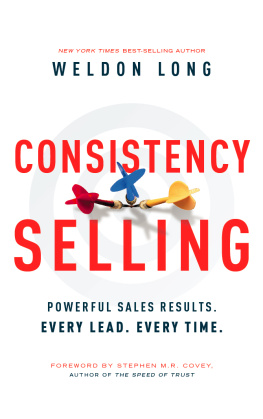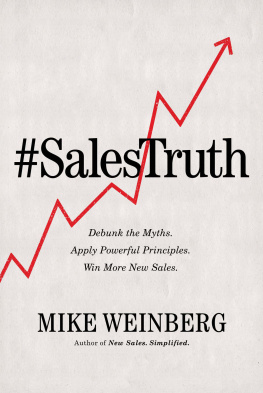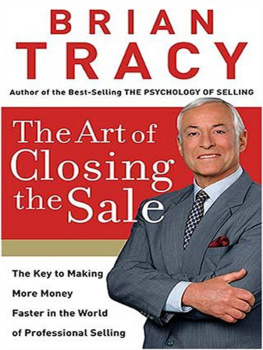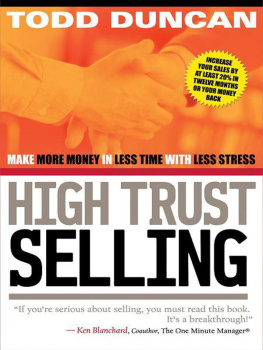PRAISE FOR 10 PRINCIPLES OF THE LIFE OR DEATH OF A SALESPERSON
In reading Virgil's book, you feel like you are discovering the long missing pieces of the sales puzzle. There are plenty of "how to sales books, but this book lets readers discover the " Why": Why do your core values make you successful in sales? Why does analyzing your journey make all the difference? Why does integrity and clarity matter? This book builds a life structure in which the main pillars speak to sales. Talk is cheap, but the essence of sales comes from the soul.
Jeff Thatcher, Founder
Discrete Wireless & Wherible GPS Products
Every young person who is starting a sales career needs to read this book as a mandatory action item. This is the path down the road of knowledge that many will discovery on their own one day. The question is how long will it take? How many times will they go on probation for poor sales performance? How many sales opportunities will they blow because they didn't allow the customer to feel their requirements were the motivating factor driving the sale, not the sellers personal gain? Virgil eloquently lays it out in this book.
Glenn Barnes, High-Volume Sales Specialist
Xerox Corporation (30 years)
In 10 Principles of the Life or Death of a Salesperson, Virgil has identified the fundamental principles which separate the good from the great. This book teaches techniques that lead to success for those who implement them.
John Robinson, Pharmaceutical Sales Manager

10 PRINCIPLES OF THE LIFE OR DEATH OF A SALESPERSON
Copyright 2018 by Virgil Blocker
ISBN: 978-1-7327132-0-8
ISBN: 978-1-7327132-1-5 (e-book)
Scripture quotations taken from the New American Standard Bible (NASB),
Copyright 1960, 1962, 1963, 1968, 1971, 1972, 1973,
1975, 1977, 1995 by The Lockman Foundation
Used by permission. www.Lockman.org
Scripture quotations taken from the Holy Bible, King James Version,
Cambridge, 1769
All rights reserved. No part of this publication may be reproduced, stored in a retrieval system, or transmitted in any form or by any means-electronic, mechanical, photocopy, recording or any other, without the prior permission of the publisher.
CONTENTS
INTRODUCTION
In an age when a person is a brand and their social media output is a commodity, the salesperson who wishes to have a successful, sustainable career must be able to do more than make cold calls and create a solid sales pitch. Today, potential customers want to buy into the salesperson before they purchase the goods or services being sold. The savvy salesperson invests as much or more into developing personal principles their customers will connect with as they do in cultivating their sales strategy.
When I first met with Virgil to assist him with bringing this book to fruition, I didnt think of myself as much of a salesperson. I considered myself to be a writer and aspiring writing coach whose passion was to help others share their story. Despite being able to check off all the must haves for people selling goods or services onlinea website, social media presence, and email listI wasnt booking the clients or selling the number of books I wanted. Through my interactions with Virgil, I began to understand the reason I wasnt making sales had more to do with my whether I adhered to the principles he espouses in the pages of this book.
Each moment of Virgils twenty-plus years of sales experience has been carefully considered and mined to produce the masterclass on success in sales you hold in your hands. Each principle is one he has put into practice in a career boasting fifteen Presidents Club Awards and numerous other industry accolades. These are not trendy techniques that will be useless when times change, but proven principles you can continue to utilize and profit from for the rest of your career.
10 Principles of the Life or Death of a Salesperson isnt just another sales book promising to make you a better salesman if you adopt a certain trendy sales technique; this book promises to change you, the person behind the sales pitch. Its no secret that people want to do business with individuals who understand what they need and will work diligently to ensure they get it. They want someone who is organized and exhibits a level of integrity in what they do. In short, they want someone they can trust.
Im still learning and growing in my journey to be a better salesperson, but the one thing Ive realized is most people need to be sold on you and your ability to see and meet their needs before you can sell them anything else. In the following pages, you will be taught ten of the most important characteristics you need to be a better salesperson. Moreover, learning and implementing each one will ultimately make you a better person. When this happens, your products and services will sell themselves.
Erica D. Hearns
Serious Season Publishing
CHAPTER ONE
TRUST
WHAT IS TRUST?
Trust is defined by Websters Dictionary as, quite often the attitude that we display towards people who we believe and to a degree hope will be trustworthy. Trust and trustworthiness are similar, yet different. In a perfect world, those we trust will be trustworthy, and those who are trustworthy will be trusted.
Trust is often mistakenly overlooked and taken for granted. Often, sales professionals are completely unaware of its value. Its important when working with your coworkers and customers because it allows you to form and develop effective relationships for support, advice, and/or approval. Since trust often involves associated risk, it can often be perceived as very dangerous. Trusting another person with your personal thoughts or professional ideas invites the risk of betrayal.
In order for trust to be validated in any relationship, both parties involved must express their willingness to trust each other. There are other conditions for trust and trustworthiness, but you should keep this at the forefront of your thoughts as you work with your peers and customers. By doing this, you are able to concentrate on effective listening and your choice of words in your discussions. The question I often ask myself is, Do my words and actions support the direction I foresee our relationship taking?
When working with coworkers and customers, I make every attempt not to disagree with their positions in discussions. Its not my goal to show them that I can support my positions in life. I simply listen for understanding while giving nonverbal gestures like head nods to show my understanding. I often use words like, good point, thats a great idea, or I understand. My goal in building trust is to remain in a position of listening, understanding, and support until the time is appropriate for me to clearly express my thoughts, ideas, or concerns.
When I was in high school, I had a friend named David. David was a very nice guy who seemed to get along with everyone. It often amazed me how people simply enjoyed his company with such ease. Being the thinker I am, I asked myself the question, What makes people seem to really like David once they meet him?
After almost 10 years of pondering this question and wondering what magical power David had that I was missing, I asked myself what it was about our relationship I enjoyed. I realized the one thing that stood out about David was that he would take the time to hear whatever thoughts someone had about any topic or concern in life, and never made a personal judgment about the person or where his or her thoughts or ideas came from. Instead, he would simply support the persons thoughts and ideas. This was the key component that separated him from other friends. This was what made him different and likable.
Next page
